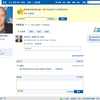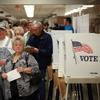Bob Garfield appears in the following:
Hurricane Hoaxes and Confused Reporting
Friday, November 02, 2012
The 24-hour news cycle and social media provided consumers with up to the minute images and information about the toll of Sandy. Too bad some of those images and information were both woefully incorrect and deliberately misleading. Brooke and Bob talk to the New Jersey Record's John Brennan and Salon's Laura Miller about how disasters plunge us into a media mix of the real, the unreal, and the unknown.
Seattle Times Purchases Political Ads
Friday, November 02, 2012
The Seattle Times Company has undertaken an experiment it says will show newspapers deserve more political ad dollars: buying and publishing political ads on its own pages. Readers have seen full-page ads in favor of the Republican candidate for governor, as well as ads in support of a referendum that would legalize gay marriage. Bob Garfield speaks with Eli Sanders of Seattle's alt-weekly The Stranger, about why the ads have infuriated subscribers and the newspaper's staff, while leaving everyone else scratching their heads.
How to Sort Good information from Bad on Twitter
Friday, November 02, 2012
Last week's storm highlighted Twitter's role as a useful (and occasionally infuriating) source of information during an emergency. OTM producer PJ Vogt talks to Bob about how to find accurate information on the platform while mostly avoiding the chaff.
Is Twitter Wrong?
Friday, November 02, 2012
Tom Phillips, the man behind a website called "Is Twitter Wrong?" worked hard during Sandy to debunk many of the false images of the storm and its aftermath. Bob speaks to Phillips about how easy it is to differentiate the real images from the fakes.
Helium - Aging Astronauts
That Little Thing Called "Like"
Friday, October 26, 2012
The Facebook "Like" button has ventured beyond the pages of Facebook. Now, not only can you tell your friends that you "Like" their comments, photos and status updates, you can also tell third-party site how much you "Like" a blog post or news article. Bob explores the meaning of a Facebook "Like."
Facebook v. Europe
Friday, October 26, 2012
Europe has long taken a harder line towards global internet companies who make privacy incursions against their users and Facebook is no exception. In the last few months, a couple of high-profile cases have seen European privacy fears realized. We asked Marketplace reporter Christopher Werth to talk to a few of the people in Europe who’ve run up against Facebook recently to see if their experiences might tell us something about Facebook’s prospective practices in the US.
The Outside Joke - My Mom’s on Facebook
Life in Facebookistan
Friday, October 26, 2012
Writer Rebecca MacKinnon has compared Facebook to a country, she calls it Facebookistan. Facebookistan has 1 billion people, and an economy that rivals many countries'. Brooke and Bob talk to Jillian York and Clay Shirky about the contours of Facebookistan, and how it affects life in the actual world we live in.
Don & Juan - What’s Your Name
China's Fake Facebooks
Friday, October 26, 2012
Facebook is blocked in China –but that hasn’t prevented homegrown Facebook knock-off sites from sprouting. And even on China’s fake Facebooks, real conversations about politics and culture are occurring every day. Jeremy Goldkorn, who monitors Chinese media at his website, talks to Bob about life on China's fake Facebooks.
Tito Nieves - I Like It Like That
Newsweek Print Edition Dies
Thursday, October 25, 2012
Bob Garfield, co-host of On the Media and author of The Chaos Scenario, and Stephen Shepard, founding dean of the CUNY Graduate School of Journalism, discuss the demise of the print edition of Newsweek and what it means for journalism.
Red Bull, NASA, and Felix Baumgartner
Friday, October 19, 2012
This week, daredevil skydiver Felix Baumgartner broke the sound barrier—and world records—when he jumped in free fall from 24 miles above the earth’s surface. People around the world watched in awe, but some criticized the jump as a mere publicity stunt for its corporate sponsor, Red Bull Energy Drink. Bob talks with Esquire contributing editor Luke Dittrich about how Baumgartner's jump, publicity stunt or not, has valuable scientific implications beyond being a PR triumph.
The End of Endorsements
Friday, October 19, 2012
If you read the local paper in Boston, Denver, or Sacramento, soon you’re likely to see endorsements for candidates cropping up on the editorial page. But if you get your news in Atlanta, Chicago, or Tuscaloosa, you probably won’t. In recent years, papers in these cities have gotten out of the endorsement business. Bob talks to Kevin Riley, editor of Georgia's largest newspaper, the Atlanta Journal-Constitution, about his paper's decision to end editorial endorsements.
Ad Nauseam
Friday, October 12, 2012
Voters in swing states are enduring a gauntlet of campaign advertising this election season. Reporter Seth Stevenson, who lives in New York City, decided to fly to one of those states (Ohio) and subjected himself to 45 hours of campaign advertising. It wasn't pleasant. Bob spoke with Stevenson, who wrote about the experiment for The New Republic.
Young Man, Big Money
Friday, October 12, 2012
When John Ramsey came into his substantial inheritance, he was still a college student. But he didn't use the money to party - instead he became an angel investor in Liberty for All, a libertarian Super Pac. Bob spoke with Ramsey about putting up his own money to support down-ticket libertarian candidates.
The World's First Political Consulting Firm
Friday, October 12, 2012
In the 1930's, married couple Clem Whitaker and Leone Baxter founded Campaigns, Inc., the world's first political consulting firm. In the ensuing 30 years, Campaigns Inc. pioneered tactics like the out-of-context quote, relentless pamphleteering, and what we now call opposition research, all techniques that are part of the modern campaign playbook. Bob talks to Jill Lepore, New Yorker contributor and author of The Story of America: Essays on Origins about Whitaker and Baxter's political legacy.
The Blaine Game
Friday, October 05, 2012
The presidency will be decided in four weeks. Syria is in flames. Spain is on the economic brink. But that’s not why representatives from more than a dozen news organizations filled a press tent this week on New York City’s Pier 54. No, they were there to cover David Blaine's latest stunt, "Electrified." Bob was there.
Should Government Fund Public Broadcasting?
Friday, October 05, 2012
Presidential hopeful Mitt Romney said in Wednesday's debate that, if elected, he'd end the use of taxpayer money to support public media. Should we? In 2010, Reason.com editor-in-chief Nick Gillespie told Brooke that yes, we should. On the other side, New Yorker editor Steve Coll told Bob why public radio should continue to receive some taxpayer support.
How "Muslim Rage" Got it Wrong
Friday, October 05, 2012
When the US consulate in Benghazi was attacked and protesters took to the street throughout the Islamic world, news reports trotted out a familiar narrative: "MUSLIM RAGE" and the clash of civilizations. Bob talks to Middle East scholar Marc Lynch, who says the media got it wrong and the real story is that protests were small, petered out quickly, and followed a radically different pattern from past anti-US agitation.
Felix - Bernard St.
Nate Silver on the Pitfalls of Prediction
Friday, October 05, 2012
Nate Silver is something of an authority on political forecasting. In 2008, his blog FiveThirtyEight correctly predicted the outcome of the presidential race in 49 out of 50 states. (In that same election, he was also right about all 35 senate races.) Bob sits down with Silver to talk about the 2012 election as well as his new book, The Signal and the Noise: Why So Many Predictions Fail—But Some Don't.
"Illegal" vs. "Undocumented"
Friday, September 28, 2012
Since writing an article called "My Life as an Undocumented Immigrant" in the New York Times Magazine last year, Pulitzer Prize-winning journalist Jose Antonio Vargas has been trying to foster conversation about immigration issues. In a speech last week at the Online News Association conference, he announced his plan to track and hopefully influence news organizations away from using the term "illegal" to describe immigrants. Bob asks Vargas why he feels this change in nomenclature is important.
Latin Playboys - Crayon Sun
"Terms of Service; Didn't Read"
Friday, September 28, 2012
With the lengths of terms-of-service agreements reaching Shakespearean proportions, it's no wonder that internet users are clicking "I Agree" without actually reading what they agree to. A website launched this summer called Terms of Service; Didn't Read is coming up with new ways to inform consumers and fix what it calls "the biggest lie on the web." Bob talks to Michiel de Jong, one of the site's "hacktivist" co-founders.



















